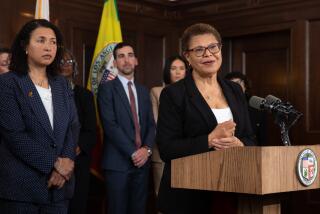Third of Cities Expect Revenues to Fall; 25% Cutting Work Force
WASHINGTON — One in three U.S. cities surveyed expects to see a decline in general revenues this year, and one-fourth of cities are reducing municipal jobs, the National League of Cities said Monday.
The organization, releasing its annual survey of city financial conditions, cited regional economic difficulties and the effects of the loss of federal revenue sharing and elements of the new federal tax law as causing difficulty for local governments.
Ominous Signals
“There are some ominous signals in these findings and others in our report,” league executive director Alan Beals said.
“It is a warning that there is a rude awakening in store for those who think our cities and towns are all prospering just because they are managing to keep their budgets balanced, while Washington--the federal government, not the city--is awash in trillions of dollars of debt.”
The organization surveyed officials in 545 communities, including the 25 largest cities.
The report said that many local governments have found ways to keep their budgets balanced while still providing necessary services.
But, Beals said, “in many communities, it’s being done through cutbacks and postponements that are eroding their capacity just to maintain current services, not to mention their ability to deal with future problems and stresses.”
The report said 33% of the cities said they expected declining revenue in 1987, compared with 1986. The expected decreases were most common among smaller cities, with more than half of those under 10,000 population saying they expected a decline.
More than a quarter of the cities surveyed said they were reducing the size of their work forces in 1987, the same percentage that said they had cut jobs last year. An additional 26% said they had a freeze on hiring.
The federal revenue-sharing program that expired last October provided $4 billion in direct aid to all local governments in the country. Beals said local governments are still trying to deal with that loss.
“The loss of general revenue sharing marked a 25% reduction in direct federal aid to municipal governments,” he said. “For smaller communities, revenue sharing was the only form of federal support they ever saw.”
More to Read
Sign up for Essential California
The most important California stories and recommendations in your inbox every morning.
You may occasionally receive promotional content from the Los Angeles Times.










